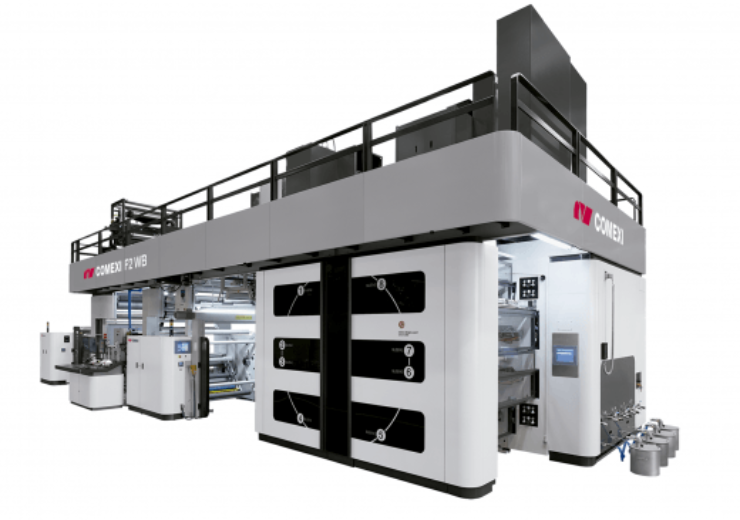The company will print on increasingly thin materials, to minimize the consumption of plastic, using solvent-free inks

Image: Comexi has committed to sustainable printing with the use of water-based and curable inks. Photo: courtesy of Comexi.
Comexi, a specialist in solutions for the flexible packaging printing and converting industry with more than 60 years’ experience in the sector, has a wide product range of flexographic presses for short, medium and long runs, which adapt to the market’s most demanding requirements. In today’s world, sustainability and recycling are increasingly gaining interest and becoming more influential. As a trend, end users desire more ecofriendly solutions that include easily-disposable materials, and as a response, Comexi is committed to sustainable printing with the use of water-based and curable Inks.
Attendees to K 2019 will be able to learn more about Comexi flexographic printing technologies. Special attention will be given to sustainability, which will include water-based printing and EB printing systems, which improve the recyclability of packaging. Furthermore, one of the main objectives of the company is to be able to print thinner materials, thus minimizing the consumption of plastic.
In recent years, Comexi has completed its range of flexographic presses, which are adaptable to all of today’s market needs: the Comexi F4 is perfect for short runs; the Comexi F2 is ideal for medium and long runs; and in particular, the Comexi F1 is a press designed to work with long runs, big widths and large repeats.
During the fair, visitors will have the opportunity to view how Comexi is adapting to the fourth industrial revolution, which is an opportunity to optimize production processes. The company has developed the Comexi Cloud, an innovative service platform that can assist customers with the improvement of their plant performance through the analysis of real-time production data, allowing them to build and develop smart factories. This online platform has completely changed the way printers and converters manage all types of processes due to its ability to visualize, compile, analyse, and store all data. Comexi Cloud is composed of different digital services linked to machines and the data these machines generate. Additionally, it allows for quick and easy integration, as well as data exchange with existing management software such as ERP, Plant Control Systems or Maintenance Management software.
Comexi Cloud includes the Comexi Ordering On-Line (COOL), an advanced e-commerce platform which permits 3D visualization of a customer’s digital twin machine, as well as accurately identifying the required spare parts at a faster speed. COOL allows customer to order spare parts with ease through Comexi’s e-commerce service, which is not only faster, simpler, and safer, but also a 24/7 online service.
The Comexi Flexo Business Unit is characterized by innovation, through the continuous release of solutions, which are based on automation and dedicated to solve daily production challenges. Market research points towards a constant reduction of job length due to the quick and continuous demand for modifications by brand owners, giving high importance to solutions focused on achieving quicker changeovers. The Comexi F1 integrates an automatic device for sleeve changeover, an innovative solution that incorporates a robot capable of automatically manipulating anilox, plate, and intermediate sleeves, in turn reducing the required time for a job changeover.
Presently, according to several reports and inquiries, the most concerning topic amongst the flexible packaging converters is the increasingly difficult task of finding expert printers. The objective of Comexi is to make machines which are able to generate relevant, valuable, and real-time production data. Comexi’s data gathering efforts move parallel with two well defined objectives. On one hand there is the complete automation of machine configuration and set up, the latter being based on applying machine learning algorithms to all the data stored in the Comexi Cloud, which includes, amongst others, speed, waste, availability and quality.
On the other hand, Comexi is developing the use of predictive maintenance and machine critical stop prediction through the analysis of normal working conditions, and establishing patterns that are considered good behaviour or altered behaviour, which could lead to a critical error, thus resulting in a printing defect or a machine stop.
Source: Company Press Release
